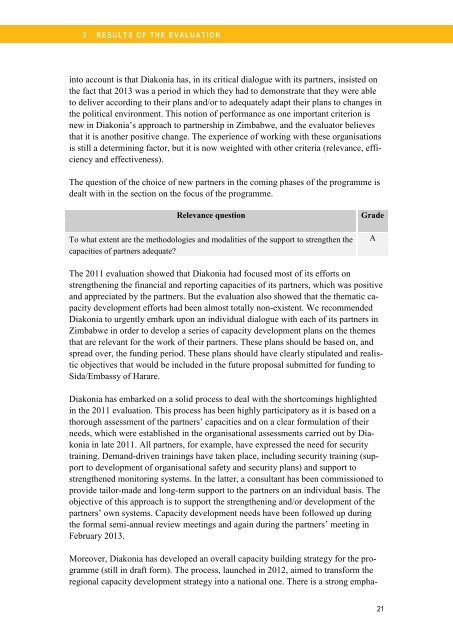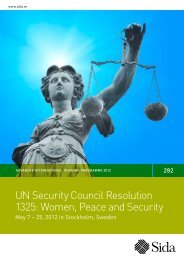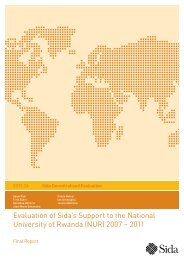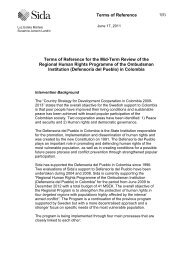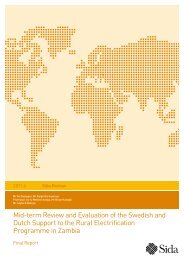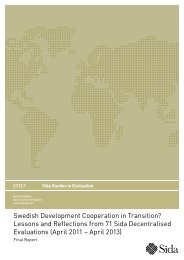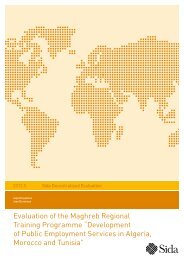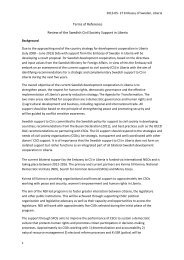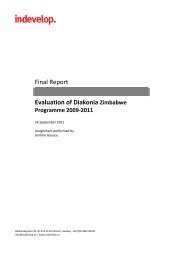Mid-term Review of the Diakonia Strategic Peace Building ... - Sida
Mid-term Review of the Diakonia Strategic Peace Building ... - Sida
Mid-term Review of the Diakonia Strategic Peace Building ... - Sida
Create successful ePaper yourself
Turn your PDF publications into a flip-book with our unique Google optimized e-Paper software.
3 R E S U L T S O F T H E E V A L U A T I O N<br />
into account is that <strong>Diakonia</strong> has, in its critical dialogue with its partners, insisted on<br />
<strong>the</strong> fact that 2013 was a period in which <strong>the</strong>y had to demonstrate that <strong>the</strong>y were able<br />
to deliver according to <strong>the</strong>ir plans and/or to adequately adapt <strong>the</strong>ir plans to changes in<br />
<strong>the</strong> political environment. This notion <strong>of</strong> performance as one important criterion is<br />
new in <strong>Diakonia</strong>’s approach to partnership in Zimbabwe, and <strong>the</strong> evaluator believes<br />
that it is ano<strong>the</strong>r positive change. The experience <strong>of</strong> working with <strong>the</strong>se organisations<br />
is still a de<strong>term</strong>ining factor, but it is now weighted with o<strong>the</strong>r criteria (relevance, efficiency<br />
and effectiveness).<br />
The question <strong>of</strong> <strong>the</strong> choice <strong>of</strong> new partners in <strong>the</strong> coming phases <strong>of</strong> <strong>the</strong> programme is<br />
dealt with in <strong>the</strong> section on <strong>the</strong> focus <strong>of</strong> <strong>the</strong> programme.<br />
Relevance question<br />
To what extent are <strong>the</strong> methodologies and modalities <strong>of</strong> <strong>the</strong> support to streng<strong>the</strong>n <strong>the</strong><br />
capacities <strong>of</strong> partners adequate?<br />
Grade<br />
A<br />
The 2011 evaluation showed that <strong>Diakonia</strong> had focused most <strong>of</strong> its efforts on<br />
streng<strong>the</strong>ning <strong>the</strong> financial and reporting capacities <strong>of</strong> its partners, which was positive<br />
and appreciated by <strong>the</strong> partners. But <strong>the</strong> evaluation also showed that <strong>the</strong> <strong>the</strong>matic capacity<br />
development efforts had been almost totally non-existent. We recommended<br />
<strong>Diakonia</strong> to urgently embark upon an individual dialogue with each <strong>of</strong> its partners in<br />
Zimbabwe in order to develop a series <strong>of</strong> capacity development plans on <strong>the</strong> <strong>the</strong>mes<br />
that are relevant for <strong>the</strong> work <strong>of</strong> <strong>the</strong>ir partners. These plans should be based on, and<br />
spread over, <strong>the</strong> funding period. These plans should have clearly stipulated and realistic<br />
objectives that would be included in <strong>the</strong> future proposal submitted for funding to<br />
<strong>Sida</strong>/Embassy <strong>of</strong> Harare.<br />
<strong>Diakonia</strong> has embarked on a solid process to deal with <strong>the</strong> shortcomings highlighted<br />
in <strong>the</strong> 2011 evaluation. This process has been highly participatory as it is based on a<br />
thorough assessment <strong>of</strong> <strong>the</strong> partners’ capacities and on a clear formulation <strong>of</strong> <strong>the</strong>ir<br />
needs, which were established in <strong>the</strong> organisational assessments carried out by <strong>Diakonia</strong><br />
in late 2011. All partners, for example, have expressed <strong>the</strong> need for security<br />
training. Demand-driven trainings have taken place, including security training (support<br />
to development <strong>of</strong> organisational safety and security plans) and support to<br />
streng<strong>the</strong>ned monitoring systems. In <strong>the</strong> latter, a consultant has been commissioned to<br />
provide tailor-made and long-<strong>term</strong> support to <strong>the</strong> partners on an individual basis. The<br />
objective <strong>of</strong> this approach is to support <strong>the</strong> streng<strong>the</strong>ning and/or development <strong>of</strong> <strong>the</strong><br />
partners’ own systems. Capacity development needs have been followed up during<br />
<strong>the</strong> formal semi-annual review meetings and again during <strong>the</strong> partners’ meeting in<br />
February 2013.<br />
Moreover, <strong>Diakonia</strong> has developed an overall capacity building strategy for <strong>the</strong> programme<br />
(still in draft form). The process, launched in 2012, aimed to transform <strong>the</strong><br />
regional capacity development strategy into a national one. There is a strong empha-<br />
21


